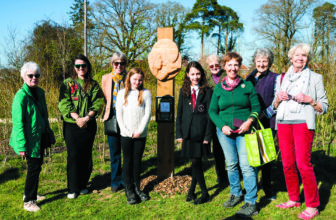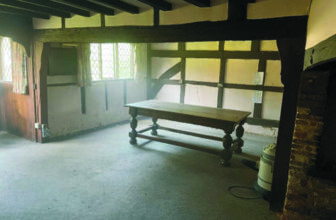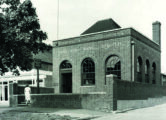
Conscription, introduced in January, was beginning to bite. All fit single men between 18 and 41 were called up. The Rector wrote: ‘we have very
few men of military age left in the village, and those that are here have been attested and wear their armbands’.
Farms, shops and industries soon began to suffer from the loss of manpower. Several employers took their case to the ‘Hambledon Appeals Tribunal’, which began to meet each week at the Guildhall in Guildford. One Cranleigh farmer applied for exemption from service for his two sons, as two of his six thrashing engines were lying idle. He had plenty of work, year round, but could not get drivers. The sons were granted exemption, but only for one month. Another farmer secured exemption for his son as there was only one other man to work a farm of 60 acres.
As a partial remedy for this labour shortage, the Surrey Education Committee convened a meeting of farmers at the Lion Hotel in Guildford and a spokesman agreed that if a boy had the prospect of work on a farm he might leave school at 13 instead of 14. However, when he suggested that the boy should be paid seven shillings a week, there was a chorus from the farmers of ‘Not me!’
In early February the Surrey Advertiser reported that the Church Lads’ Brigade had ceased to exist in Cran-leigh, because 40 members had left to serve in the forces. The next week, though, this report was strenuously denied. The Cranleigh Church Lads’ Brigade was ‘very much alive’ under 2nd Lt. Harold Winser. His bakery and tearoom was in Kent House, where Barnardo’s now is. He ran a coal business as well in the yard behind!
News came of the deaths of further Cranleigh men. Harold Frank Swallow, aged 19, of the 7th Battalion, The Queen’s regiment, who lived in Bookhurst Hill, was killed instantly by a shell on 3rd of February in the trenches near the river Ancre. He left a wife, Katie, and a baby son, Frank, of five months, whom he had never seen. Harold’s father had founded the Bookhurst Pottery (later known as ‘Swallow’s Tiles’), and before the War Harold had been a ‘clay worker’ in the family business.
Private James Surman of the 1st Battalion, The Queen’s regiment, was killed on 14th of February on the Western Front, at Annezin near Béthune, aged 22. The dreaded telegram was delivered to his home next door to the Cricketfield Stores on the Common (to the left of this photo, and out of sight). Before the war he had been a barber.
The Cranleigh History Society meets on the 2nd Thursday of each month at 8.00pm in the Band Room. The next meeting will be on Thursday 11th February, when Sheila Willis’s subject is ‘Poisonous Plots – a policewoman’s look at crime via poison’.











